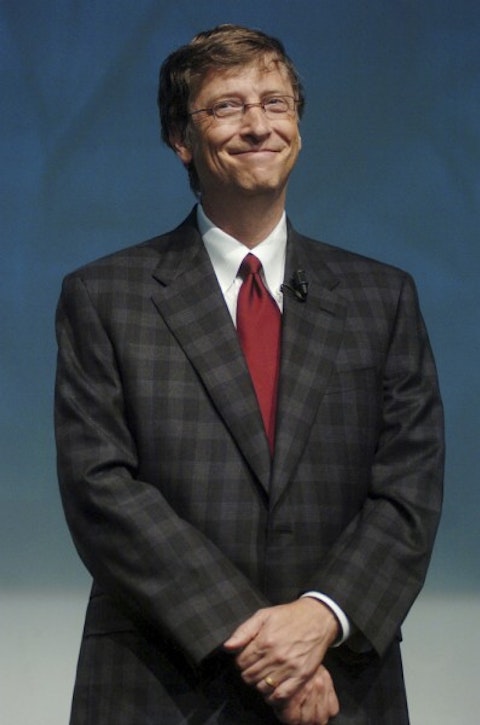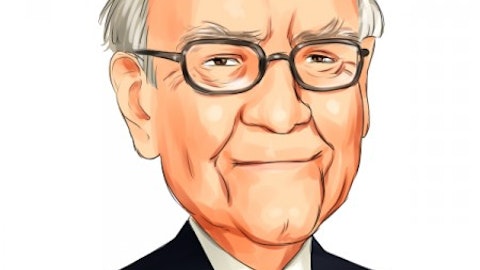To get a glimpse of a genius mind, one needs to know the kind of book he reads, so today we’ll be looking at the 11 business books Bill Gates wants you to read. Industry leaders like Gates don’t rely on their wit and experience alone. They consult people, read books, and utilize various resources to increase their knowledge and understanding. Gates sees to it that he reads one book a week or roughly 50 books a year. He also writes thorough and insightful book reviews!
William Henry “Bill” Gates III is the co-founder of Microsoft along with Paul Allen. Microsoft is the world’s largest software company with a current market cap of $340.8 billion. Gates was born in Seattle, Washington on October 28, 1955. At age 17, his passion for computers peaked with his creation of a tic-tac-toe program that allows users to play against computers. He dropped out of Harvard to put up his own computer company.

Paolo Bona / Shutterstock.com
Fast forward to today, Gates is the richest man in the world with a real time net worth of $75.9 billion at the time of writing this article. He was named the world’s youngest billionaire in 1987 with a net worth of $1.25 billion before he turned 32. He was named by Time Magazine as one of the Time 100: The Most Important People of the Century and have been included multiple times in the annual Time 100 Most Influential People.
In 2008, the Microsoft co-creator resigned from the company he built so he could focus on the Bill & Melinda Gates Foundation, which he established with his wife back in 2000. They have been devoting their resources to helping alleviate poverty and improve healthcare in the world’s poorest countries. In 2010, they pledged $10 billion a year over the next decade to help in the research and development of vaccines in poverty-stricken countries.
We kicked off this series with the 11 investing books billionaire Warren Buffet wants you to read. Compared to Buffet, Gates’s reading list is a sundry of fiction and non-fiction books. But for this roster, we will only look at his recommended business-related books. We curated this list from Gates Notes, Time, Gates’s TED 2015 Recommended List and Personal Reading List, and the Observer. Let’s flip some pages!
11. “How Asia Works” by Joe Studwell
Gates had this to say about the book, “I found the book to be quite compelling…Studwell’s book does a better job than anything else I’ve read of articulating the key role of agriculture in development…A good read for anyone who wants to understand what actually determines whether a developing economy will succeed.” This book has a 4.4 rating on Amazon from 62 customer reviews with 68% of readers giving it 5 stars. Gates named “How Asia Works” as one of this Top 5 Books of the Year in 2014.
What is the book about? Author Joe Studwell is a business journalist who aims to understand the development of different countries. In this book, he looks closely at nine Asian countries namely Japan, South Korea, Taiwan, Indonesia, Malaysia, Thailand, the Philippines, Vietnam, and China—and presents in a readable narrative how some of these countries flourish and others don’t.
10. “Stress Test” by Timothy F. Geithner
Gates described the book this way, “Geithner paints a compelling human portrait of what it was like to be fighting a global financial meltdown while at the same time fighting critics inside and outside the Administration as well as his own severe guilt over his near-total absence from his family.” The book has a 4.2 rating on Amazon from 457 customer reviews with 57% of readers giving it 5 stars.
What is the book about? Author Timothy F. Geithner served as president of the Federal Reserve Bank and U.S. Treasury Secretary under President Barack Obama. He gives readers an inside look at what happens behind the scenes when a financial crisis hits a country like the U.S. It reveals the difficult choices and unpalatable political moves that need to be done. He also narrates how a small group of policy makers helped prevent a second depression.
Gates said, “The politics of fighting financial crises will always be ugly. But it helps if the public knows a little more about the subject—what’s at stake, what the options are, what has worked in similar situations—so that the loud talkers resonate a bit less and the knowledgeable ones a bit more.” This book is also a valuable resource that will help governments manage financial crises better.
9. “Tap Dancing to Work: Warren Buffett on Practically Everything, 1966-2013” by Carol Loomis
Buffett and Gates are undeniably great friends with the two having a penchant for exchanging book recommendations and backing each other up in philanthropic efforts. Thus, it comes as no surprise that this is one of Gates’s favorite books. “Tap Dancing to Work” has a 4.2 rating on Amazon from 157 customer reviews with 53% of readers giving it 5 stars.
What is the book about? It is an anthology of articles and essays about the Oracle of Omaha curated by Fortune Magazine journalist Carol Loomis. It features a 1996 article written by Gates about his early impressions on Buffet before they became close friends. The Microsoft founder described Buffet as “incredibly consistent in applying his vision and investment principles over the duration of his career.” He also added, “I’d never met anyone who thought about business in such a clear way. That is certainly still the case.”
8. “How to Lie with Statistics” by Darrell Huff
Gates picked up this book after seeing it appear on Wall Street Journal’s recommended books for investors. It has a 4.5 rating on Amazon from 363 customer reviews with 66% of readers giving it 5 stars. Despite being published in 1954, Gates said that “it doesn’t feel dated.” In fact, he thinks that it’s relevant now more than ever.
What is the book about? Gates described it as, “A great introduction to the use of statistics, and a great refresher for anyone who’s already well versed in it.” He added that the author reveals how statistics can be used to give distorted analysis and even exaggerate trends. Gates also said that, “it’s a timely reminder, given how often infographics show up in your Facebook and Twitter feeds these days.”
Author Darrell Huff warns readers, “The secret language of statistics, so appealing in a fact-minded culture, is employed to sensationalize, inflate, confuse, and oversimplify.”
7. “SuperFreakonomics” by Steven D. Levitt and Stephen J. Dubner
Gates have nothing but praises for this book, “I really liked Freakonomics and I think SuperFreakonomics is even better…I recommend this book to anyone who reads nonfiction. It is very well written and full of great insights.” The book has a 4.0 rating on Amazon from 872 customer reviews with 48% of readers giving it 5 stars. This freakquel is described as bolder, funnier, and more surprising than its predecessor.
What is the book about? The Levitt and Dubner tandem explores different things such as climate change, catching terrorists, and many aspects of our lives that we often take for granted. Gates said in his book review, “One of my favorite things in the book is the debunking of many of the studies economists have done that they use as the basis for claiming that people are irrational in their choices. Dubner and Levitt cover new research that shows that the wrong conclusions were drawn.”
6. “Where Good Ideas Come From” by Steven Johnson
Books on innovation is a dime a dozen which is why Gates was initially skeptical when he got the book. He said, “Lots of books have been written about innovation—what it is, the most innovative companies, how you measure it. The subject can seem a little faddish, but Johnson’s book is quite good at giving examples of how you create environments that can encourage good ideas.” The book has a 4.2 rating on Amazon from 169 customer reviews with 56% of readers giving it 5 stars.
What is the book about? Author Steven Johnson presents seven key patterns behind innovation and analyzes them across different industries and time frames. From Darwin to Google, he probes innovation hubs and reveals the common denominator among their “moments of originality.”
But Johnson challenges this view, which I liked: ‘We have a natural tendency to romanticize breakthrough innovations, imagining momentous ideas transcending their surroundings…But ideas are works of bricolage…We take the ideas we’ve inherited or that we’ve stumbled across, and we jigger them together into some new shape.’” This book truly deserves a spot in the 11 business books Bill Gates wants you to read because every organization will always need innovation.
5. “Mindset: The New Psychology of Success” by Carol Dweck
Gates first encountered “Mindset” from an innovation education assembly held by his friend Nathan Myhvrold. He said this about the book, “Dweck’s research had a big impact on our thinking that day. And in the years since, Dweck and her research have helped my foundation colleagues and me understand more about the attitudes and habits that allow some students to persevere in school despite big challenges.” The book has a 4.4 rating on Amazon from 1,553 customer reviews with 66% of readers giving it 5 stars.
What is the book about? Stanford University psychologist Carol Dweck reveals in this book that it’s not simply one’s talents and abilities that can make a person successful. What’s more important is how we approach it with either a fixed or growth mindset. She explains that having the right mindset can help students and professionals perform better.
In his review, Gates differentiates “fixed mindset” from “growth mindset” saying, “In experiment after experiment, Dweck has shown that the fixed mindset is a huge psychological roadblock—regardless of whether you feel you were blessed with talent or not. If you have the fixed mindset and believe you were blessed with raw talent, you tend to spend a lot of time trying to validate your “gift” rather than cultivating it.”
Meanwhile, “growth mindset” as explained by Gates is, “people with the growth mindset believe that basic qualities, including intelligence, can be strengthened like muscles…Instead, in Dweck’s words ‘they believe a person’s true potential is unknown (and unknowable); that it’s impossible to foresee what can be accomplished with years of passion, toil, and training.’”
4. “Business Adventures” by John Brooks
A book recommended by Buffett to Gates, the computer genius said that “Business Adventures” is still the best business book he has ever read. It presents stories about Wall Street narrated with drama and adventure. First published in 1969, the lessons found in John Brooks’s masterpiece is still applicable to present-day situations. The book has a 4.1 rating on Amazon from 289 customer reviews with 55% of readers giving it 5 stars.
What is the book about? Brooks provides insights on the perennial fundamentals of business such as how to handle the challenges of building a big company, hiring the right people, and the importance of customer feedback. All of these are narrated in the context of the stories behind different companies.
3. “Capital in the Twenty-First Century” by Thomas Piketty
Gates heard about this book from friends who strongly recommended it to him. After reading it he started to recommend it, as well.”The book has a 4.0 rating o n Amazon from 1,676 customer reviews with 59% of readers giving it 5 stars.
What is the book about? In “Capital in the Twenty-First Century,” author Thomas Piketty analyzes data from 20 different countries to isolate economic and social patterns. His findings provide valuable lessons on wealth and inequality. He opens a debate on the concentration of income in the hands of the elite and how this can affect our market system over time.
Gates concurs with Piketty in three important aspects, “I very much agree with Piketty that: (1) High levels of inequality are a problem—messing up economic incentives, tilting democracies in favor of powerful interests, and undercutting the ideal that all people are created equal. (2) Capitalism does not self-correct toward greater equality—that is, excess wealth concentration can have a snowball effect if left unchecked. (3) Governments can play a constructive role in offsetting the snowballing tendencies if and when they choose to do so.”
2. “Poor Numbers” by Morten Jerven
The complete title of this book is “Poor Numbers: How We Are Misled by African Development Statistics and What We Can Do About It.” Being a philanthropist, the topic of poverty is close to Gates’s heart and it should be for other businessmen, too. With CSR efforts increasing in big organizations, giving back has never been more vital and crucial especially in impoverished countries. With the help of Gates’s foundation, Africa went on a full year without Polio in 2015. This book has a 4.6 rating on Amazon from 17 customer reviews with 65% of readers giving it 5 stars.
What is the book about? Author and economist Morten Jerven, spent four years studying how African nations derive their statistics and discovered how their GDP figures were far from accurate. Gates said in his review, “Jerven uses all these discrepancies to argue that we can’t be certain whether one poor country’s GDP is higher than another’s, and that we shouldn’t use GDP alone to make judgments about which economic policies lead to growth.”
1. “The Road to Character” by David Brooks
Gates describes this book as, “It certainly was a stimulating read, and it got me thinking about my own motivations and limitations in new ways.” New York Times columnist David Brooks wrote the book to discover what the road to character looks like and how other people have walked on it. This is crucial in the business world where integrity and compromise have an ongoing tension. The book has a 4.2 rating on Amazon from 1,175 customer reviews with 59% of readers giving it 5 stars.
What is the book about? Brooks presents the contrast between “résumé virtues” (traits for external success or Adam I) and “eulogy virtues” (traits for internal peace of mind or Adam II). He profiles the character of different people throughout history and concludes by saying that the American society has failed in balancing the success virtues versus legacy virtues.
Gates shared some of his insights in his review, “Brooks fleshes out the Adam I/Adam II metaphor by offering profiles of a broad set of historical figures. Not all of them are paragons of virtue. But they are paragons of character…I agree with Brooks that it’s useful to think about how to get the balance right. In a chapter entitled ‘The Summoned Self,’ he suggests that the voice of Adam II gets louder when we ask ‘What are my circumstances calling me to do?’”
These 11 business books that Bill Gates wants you to read presents different facets of the business world. From Wall Street to capitalism, innovation, and character building, these resources offer valuable insights to achieving success in business regardless of one’s industry. These books can give you an idea on what Gates values and use them as leverage in the way you conduct your own business.





